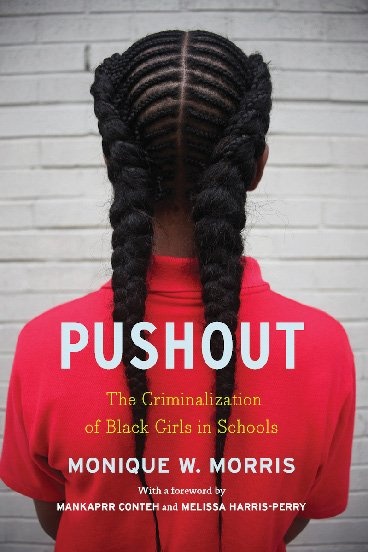Columbia College | Columbia University in the City of New York
Making Schools Safe for Girls of Color

Morris at the October screening of PUSHOUT, hosted by the Georgetown Law Center on Poverty and Inequality.
Sancha McBurnie
Monique W. Morris ’94, GSAPP’96 was answering questions from the audience after a screening of her new film, PUSHOUT: The Criminalization of Black Girls in Schools, when one of the young women featured in the documentary — a survivor of commercial sex trafficking — took the microphone and started to field queries herself.
“It was great,” Morris recalls. “Part of what we wanted to do with this film is demonstrate that there is an incredible resilience in these girls. With the right kind of intervention and guidance, they can come back and be community leaders. That’s exactly what she’s done.” By providing such assistance, Morris, an expert in how black girls are affected by racial and gender disparities in the education system, has empowered her research subjects to become experts themselves.
PUSHOUT is Morris’s first film, based in part on research and first-person interviews she conducted for her 2018 book of the same name. Morris learned that black girls in high school are six times more likely than white girls to be suspended and two times more likely to receive corporal punishment in states that still allow it. They are also three times more likely to receive one or more in-school suspensions, four times more likely to be arrested, three times more likely to be restrained and three times more likely to be referred to law enforcement.
“There are different ways of doing this,” says Morris, co-founder and president of the National Black Women’s Justice Institute. “We don’t have to treat our young people this way.”

What makes Morris’s work unique is that she doesn’t just point out a problem — she also offers solutions. Her approach has led to powerful partnerships; in September, Rep. Ayanna Pressley (D-Mass.), who, as a Boston city councilor worked with Morris on previous research in that city’s schools, hosted the premiere of PUSHOUT at the Congressional Black Caucus Legislative Conference. And in December, Pressley and Rep. Ilhan Omar (D–Minn.) introduced federal legislation based on Morris’s research. Named for the film, the Ending Punitive, Unfair, School-based Harm that is Overt and Unresponsive to Trauma (PUSHOUT) Act would establish $2.5 billion in grants to support states that commit to banning discriminatory practices, invest $2.5 billion to shore up the civil rights work of the U.S. Department of Education and create an inter-agency task force to eliminate the disparate impacts of school disciplinary policies on girls of color.
Morris’s other recent work includes a 2019 book, Sing a Rhythm, Dance a Blues: Education for the Liberation of Black and Brown Girls, which highlights educators and administrators who are successfully exploring non-punitive responses with girls of color. Taken together, the books, film and legislation “are really about, how do we begin to shift a public narrative so we recognize that hurt people hurt people?” Morris says. “We need to facilitate healing as opposed to deepening harm through punishment. Young people who are acting out in school are acting out because there’s been a deep disruption in their lives.”
Even when teachers and school officials recognize that reality, there is a tendency to point fingers — at poverty, at parents, at historical oppression, Morris says. But that’s too passive, she argues. “We’ve got to move past the blame game,” she says. “We have a responsibility to try to make things better right now.”
Morris says she first recognized that responsibility when she was a student at the Architecture School working on her thesis about the impact of residential juvenile correctional facilities on black community development. Some of the girls she met were survivors of sexual assault, as Morris herself is.
“I realized that many of the girls dealt with conditions similar to my own life,” she says. “The critical difference was education. I didn’t have to fight anymore because I could write.”
More from Morris
Columbia College Women is hosting a free virtual book talk with Monique Morris on
on Saturday, April 11; register here.
You can also read an excerpt from
PUSHOUT on our website.
The San Francisco native also recalls deep conversations about historical narratives with the DeWitt Clinton Professor Emeritus of History Eric Foner ’63, GSAS’69. She credits them as formative to her experience as one of the founding student staff members of the Institute for Research in African American Studies, which was created in 1993 by Professor Manning Marable.
“I will always be grateful for his guidance and mentorship,” she says of Marable, who died in 2011.
Morris calls efforts to raise awareness about black girls’ treatment in schools “freedom work.” If education is an antidote for criminalization and incarceration, then “our efforts should be to keep girls in school, not to find ways to take them out of it,” Morris says. “This is fundamentally about facilitating freedom.”
Rebecca Beyer is a freelance editor and writer who lives in Boston.
Issue Contents
Published three times a year by Columbia College for alumni, students, faculty, parents and friends.
Columbia Alumni Center
622 W. 113th St., MC 4530, 6th Fl.
New York, NY 10025
212-851-7852
cct@columbia.edu
Columbia Alumni Center
622 W. 113th St., MC 4530, 4th Fl.
New York, NY 10025
212-851-7488
ccalumni@columbia.edu

